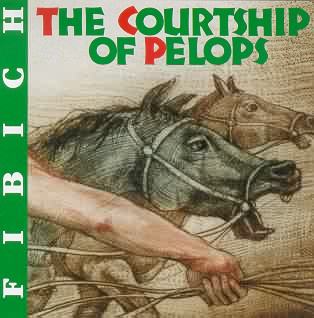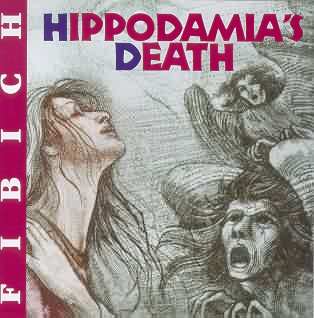Jaroslava Adamova - Hippodamia
Eduard Cupak - Pelops
Rudolf Hrusinsky - King Oenomaus
Martin Ruzek - Tantalus, King of Argos
Josef Vinklar - Myrtilus
This massive six and three quarter hour cycle of ‘shock’ melodramas
follows the classical story of Hippodamia. The epic story is presented in
the form of a radio play with a constant fabric of music underpinning the
words and action.
Each of the three handsomely designed sets of CDs comprises two discs and
comes with a full set of notes and a booklet of the complete spoken text
in both Czech and English. The notes and separate synopsis are in English,
German, French and Czech.
What would Richard Strauss have made of this salty gore-stained story? Desire
and revenge, tragedy and passion crash and heave like monstrous waves. In
Act 1 of the first of the cycle Hippodamia kisses the severed and impaled
head of one of her hapless suitors who failed in the contest for her hand.
This is years before Salome.
The balance favours speech at some slight disadvantage to the audibility
of the music. The two are woven together but the words are the lead component.
In other melodramas or orations more prominence is given to the music. I
think particularly of Prokofiev’s Eugene Onegin where the rollingly
magical text seems to achieve an equal symphonic balance with the, music.
This is best heard in the Melodiya LPs (not yet reissued) rather than the
atmospheric English language set produced by Chandos.
Fibich clearly invested much effort in Hippodamia and had written three other
melodramas what appear now, from this perspective, to be an apprenticeship
for this giant of work.
Grove V speaks of the vast complexity of leitmotivs linked to each
of the many characters who populate the triptych and whose bodies lie broken
and bleeding throughout the great story. Not to worry; the eloquent pleasures
of the music are accessible without having to identify and map out these
character signposts.
The cast is consistent across the three dramas and so are orchestra and chorus.
The more internationally known Jaroslav Krombholc directs the first drama.
Frantisek Jilek conducts the second and third parts.

1. The Courtship of Pelops (4 acts)
Jaroslava Adamova; Eduard Cupak; Rudolf Hrusinsky
Kuhn Mixed Choir/Pavel Kuhn
Brno State PO/Jaroslav Krombholc
Pelops arrives at Pisae a city ruled by King Oenomaus. The king has a daughter,
Hippodamia. Suitors are put to the test in a chariot race and if they fail
are slaughtered and their dripping heads impaled on stakes on the city walls.
Pelops set his heart on Hippodamia and she on him. She fixes the chariot
race so that her father loses and is mortally wounded. She wishes to rule
with Pelops. Wedded, the two return to Pelops’ home and Hippodamia discovers
Pelops has a childless wife who Pelops promises to banish. The couple are
followed by Myrtilus the charioteer who had conspired to kill Oenomaus and
who loves Hippodamia. When it becomes apparent that Myrtilus is in love with
Hippodamia and had fixed the race and killed the king Pelops fights with
Myrtilus and throws him over a cliff into the sea far below. Pelops and
Hippodamia fall into each others arms. This is promising operatic stuff.
The Fibich’s slightly Schumann-inflected language is leavened by the
blackest of brass contributions underlining the dark skein of intrigue and
lust. The actors are uniformly excellent, intoning the Czech words and investing
them with feeling. It is really more like a radio play with a larger-than-life
musical score. It is a continuous tapestry of melody rather than incidental
music which often comprise brief packets of music here and there.
At end of track 2 (disc 1) listen to the drum-beat which gives forward momentum
and suggests fear over Myrtilus’s resentment and commitment to intrigue.
Other highlights include the solo violin’s sweet singing in the prelude
to scene 3. There is also a great paean of triumph and anticipation to announce
the start of the chariot race in which King Oenomaus’s death is planned
by Hippodamia who must have Pelops.
The music occasionally sounds like Elgar (would Elgar have completed his
sacred trilogy if he had committed to melodrama rather than sung oratorio?).
Other ‘voices’ are there too: Brahms, Beethoven, Schumann (quite
often), Smetana and Dvorak.
*************
2. The Atonement of Tantalus (four acts)
Jaroslava Adamova; Eduard Cupak; Martin Ruzek
Kuhn Mixed Choir/Pavel Kuhn
Brno State PO/Frantisek Jilek
***************
Vrchlicky (the playwright) wrote Tantalus in the knowledge that it
would be set to music by Fibich. The other two parts were written quite
independently and earlier. The first to appear was Hippodamia’s
Death. Vrchlicky’s play ‘A Night at Karlstein’ was the
inspiration for Fibich’s overture (a work which, in its whirling and
bubbling champagne energy, is fully the match for Smetana’s Bartered
Bride overture) of the same name.
The plot of part 2 continues from where the first melodrama ends and does
so without a temporal break. Pelops returns with Hippodamia to his home and
his father King Tantalus. He rejects his virtuous and innocent childless
wife, Axiocha and with Hippodamia humiliates her in front of the people.
Pelops returns to Pisae to put down an invasion. Tantalus, guilt-ridden by
his own previous crimes, announces that his kingdom shall be open to any
seeking asylum. Axiocha returns and takes him up on this. Hippodamia ensures
that she is rejected. Tantalus is racked by yet more guilt. Pelops returns
to discover that after her exile Axiocha bore a child but has been killed
on Hippodamia’s orders. He promises his wife’s shade that he will
protect the child. Tantalus adopts the child. The bloody Hippodamia vows
the child shall die but, despite her entreaties, Pelops acknowledges the
child as his own. Tantalus dies atoned in his son’s arms.
The second in the cycle launches with a sullen indomitable prelude. The rich
interweaving of themes amongst a great tapestry of music continues unabated.
There are so many striking effects. Track 12 (disc 1) for example is notable
for the cry of ‘aaaah’ which is repeated in tones of increasing
resignation and tenderness by the chorus. The orchestra throughout is a grand
and large one featuring harp and gong. As for the themes, they are often
memorable though the grandiose theme for Tantalus is pompous and hollow (at
least partially suitable - the pity is that there is not enough torture in
his music).

3. Hippodamia’s Death (four acts)
Jaroslava Adamova; Eduard Cupak; Josef Vinklar
Kuhn Mixed Choir/Pavel Kuhn
Brno State PO/Frantisek Jilek
The final instalment of this royal soap (or gore) opera was written first
in time by Vrchlicky.
Twenty years have passed under Pelops’ rule. Pelops is now king of Elis.
He is married to Hippodamia and they have two sons Atreus and Thyestes, the
latter a chip off Hippodamia’s block - thirsty for power, full of treachery
and scheming. Chryssipus, Pelops’ son with Axiocha, is favoured by Pelops.
Myrtilus returns having been thought to have been slain at the end of part
I. Airopa, a hostage princess living in Pelops’ court, is the source
of trouble among the three sons. Hippodamia spurs her all too willing sons
into plotting against Chryssipus. Myrtilus returns as a beggar like an echo
of Ulysses. The games are to be held and against their father’s express
prohibition Chryssipus and Atreus enter the games and the games are abandoned.
Myrtilus meets Chryssipus and tells him of his father’s crime and the
role played by Hippodamia. Chryssipus denounces his mother for the murder
of Oenomaus. Atreus stabs Chryssipus who dies but not before cursing Hippodamia.
Thyestes draws his knife and finishes off Chryssipus. Pelops is devastated
by the loss of his favourite son and be the revelation of a dark secret which
only Myrtilus could have known. Pelops determines to find Myrtilus and extract
the truth about the plot and whether Myrtilus had been rewarded with
Hippodamia’s bed. Airopa, misled by the treacherous Thyestes, leaves
the city. Pelops banishes Atreus and Thyestes for the death of Chryssipus.
Hippodamia will not support this decision. Hippodamia makes Atreus promise
to kill Pelops. Atreus pretends to be Chryssipus and goes in that guise to
see Myrtilus. Hippodamia is tormented by her multiple levels of guilt. She
turns on Pelops blaming him. Pelops forces her to confess all that she has
done and she turns on him with a dagger. Myrtillus refuses to tell Pelops
what reward he received for conspiring in killing Oenoamus. Pelops kills
Myrtillus. Hippodamia sees her father’s dying curse coming true around
her and in despair stabs herself. Pelops leaves to open his palace to the
divine retribution of the Furies. All ends in a bleak negation.
Track 3 of CD 1 delivers a grand triumphant ceremonial scene. For the first
time we get an impression strongly reminiscent of Dvorák and this
returns again in tracks 5 with a grand march hinting at Dvorák’s
Symphonic Variations and also in track 13. Track 11 has music of overflowing
great tenderness. An odd echo Boieldieu is found in the harp solos in track
14. The music is hyper-romantic with modernistic brass. The textures become
more impressionistic and there are hints of mature Tchaikovsky.
The second disc opens by unfolding a shapely Elgarian tune with a dash of
Lizst. This is energised by a white-glowing passion and by a waywardness
which contrasts with the customarily more uncomplicated Dvorak. The music
underpinning track 5 is of similar character but again with washes of
Tchaikovsky; witness the clarinet tune in track 5 at 3:23. Turmoil is to
the fore in this last part of the trilogy. An uncanny fore-echo of
Sibelius’s Pohjola’s Daughter surces in track 9 at 1.25 and the
Finnish composer’s first symphony seems about to rear up in track 12.
The acting is fully committed coaxing or berating, loving or cold. Overall
the feeling of summation and consummation makes this listening experience
distinctive and worth the effort of concentration.
If I had to restrict myself to only one of the trilogy this is the one I
would choose.
**************
SUMMARY
Fibich is a significant composer who wrote rewarding lyrical music without
the revolutionary edge of a Janacek but with a sturdy and often inspired
gift for melody and drama. These strong gifts are to the fore in this towering
cycle. His orchestration tends towards Dvorák and Smetana but is no
empty facsimile of either.
I do not know his operas but would expect them to be well worth the effort.
In many ways the Hippodamia trilogy is a counterpart for an operatic
cycle. He must surely have wondered about it as a sort of Czech national
Ring. Its themes are universal and in their extremes of emotion will
hold the attention. The figure of Hippodamia is not a sympathetic one but
is certainly commanding. She is in some ways a combination of Lady Macbeth
and Balakirev’s Tamara.
Those who would like to learn some Czech (which seems to be precisely though
not pedantically enunciated although I confess I do not know the language
at all) will, no doubt, find the set worthwhile and would wile away a long
journey in the car or on headphones in the train or coach.
The Supraphon catalogue seems quite stable but I would recommend a prompt
purchase of this full price set (although each part is I believe available
separately) for those at all interested in this lively monument to a fine
composer. His music is pretty consistently rewarding and his oeuvre still
seems likely to have many agreeable surprises and challenging discoveries
for us.
The musical language of the melodramas is tangy but familiar and when mixed
with the resonantly acted words makes for a powerful epic experience. Recommended
for those who enjoy the Fibich symphonies, Suk’s Asrael and Dvorak.
I should also have added that the music is quite Tchaikovskian especially
in part 3.
Reviewer
Rob Barnett



